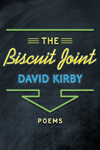 The reviews for David Kirby's recent collection of poems, The Biscuit Joint (Louisiana State University Press, 2013), praise his mastery of language and his expertise at livening up everyday occurrences. Kirby's most significant words come before even the first line of poetry is read, however, in his dedication to Jeanne Leiby.
The reviews for David Kirby's recent collection of poems, The Biscuit Joint (Louisiana State University Press, 2013), praise his mastery of language and his expertise at livening up everyday occurrences. Kirby's most significant words come before even the first line of poetry is read, however, in his dedication to Jeanne Leiby.
 "All writers want to use craft and invention to persuade the reader that their world is the real world; that's what the poems in The Biscuit Joint are about, and it's why I dedicated this book to her," Kirby writes.
"All writers want to use craft and invention to persuade the reader that their world is the real world; that's what the poems in The Biscuit Joint are about, and it's why I dedicated this book to her," Kirby writes.
Leiby, a fiction author and teacher and editor for multiple journals, became editor of The Southern Review in the spring of 2008, but she died in April 2011 following a car accident in Louisiana.
"Jeanne was editor of The Southern Review for only three years, but during that time, she published eight poems of mine," Kirby writes in the dedication. "Better yet, every time Jeanne saw me, she'd throw her arms around my neck and say, 'You're my favorite poet.' I'm sure she said this to other people—I hope she did, because a writer can hear no sweeter words."
Nineteen poems strong, the book's title is "inspired by the carpenter's biscuit joint—a seamless, undetectable fit between pieces of wood," according to the LSU Press description. This collection "dramatizes the artistic mind as a hidden connection that links the mundane with the remarkable. Even in our most ordinary actions, Kirby shows, there lies a wealth of creative inspiration: 'the poem that is written every day if we're there / to read it.'"
"For the longest time, I'd wanted to put together a book of poems about art, invention, innovation, creation: you name it, I wanted it in that book," Kirby says. "Nothing focuses you like the death of someone you love, so I began to get serious about making this book as a tribute to Jeanne."
The Biscuit Joint is Kirby's second book of poetry in three years—following his 2011 publication of Talking About Movies With Jesus—and reviewers seem to enjoy chasing down the right words to describe their appreciation for his cleverness with language and imagery.
"There's no way to define the poems of David Kirby simply, but I'll try," writes Andrew Burnstein for The Advocate, Baton Rouge's daily newspaper. "If you can picture an accomplished student of philosophy—a very likable guy—who wakes up one day to find himself as manic as a classic cartoon character, you have a pretty fair idea of the Kirby effect." Bret McCabe, in his review for Johns Hopkins Magazine, acknowledges the breadth of Kirby's career: "Kirby has spent four decades peeling the banana of everyday life to bite into its flesh in language that once might've been called the vernacular… And with The Biscuit Joint, he pens a persuasive argument that life is essentially trivial and monumentally important simultaneously: major events and prosaic routines run together like unpunctuated sentences; they're turned into our experiences in memory's editing room."
Joelle Biele, for Harvard Review Online, writes that Kirby is "a performer at heart" and that his "gift is the free-wheeling, comic monologue." In The Biscuit Joint, he "mixes references to the canon with details about life in Tallahassee. Plato, Gaugin, and Cymbeline, all make an appearance, as do an 89-cent cup of coffee, 'Tutti Frutti,' and a bag of chips… Kirby [is] a poet of shared humanity."
Kirby also is a National Book Award finalist (for his 2007 The House on Boulevard St.) as well as the recipient of numerous other awards for his writing and teaching. He added a 2014 Silver Medal from the Florida Book Awards for The Biscuit Joint.
"Some people will tell you you shouldn't write about writing, but what they mean is that you shouldn't write about failed writing," Kirby says. "And they're right: as they say in Hollywood, self-pity is not big box office. But I can't imagine a more joyous subject than the celebration of creativity of all kinds, from heart transplants and new hot dog toppings to the Sistine Chapel ceiling."
